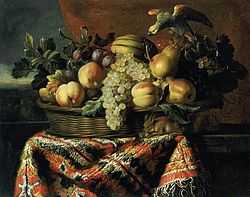Peter van Boucle

Peter van Boucle (also Peter van Boeckel, Pieter van Boeckel, Pierre van Boucle, Pieter van Boeckel, Pieter van Bouck, Pieter van Boucle, Pieter van Bouck, Pieter Boucle, Pierre van Boucle) (between 1600 en 1610 (?), probably Antwerp - 1673, Paris) was a Flemish Baroque painter who worked in Paris for a large part of his life.
Life
There is little information available about the life and training of Peter van Boucle. He claimed that he was a pupil of Frans Snijders but there are no written sources available in Antwerp that support this contention. However, there are stylistic similarities in his works which suggest that he worked in the vicinity of Frans Snijders.[1] His father Carel was an engraver, who had become a master in the Guild of St. Luke of Antwerp in 1603 and emigrated to Paris in 1617.[2] Peter van Boucle was registered with his father in Paris in 1623. At that time many Flemish artists were active in the Parisian district of Saint-Germain des-Près.[3]
He worked for a while with the still life painter Lubin Baugin in the studio of Simon Vouet. Here they made designs for tapestries (which have not been located). He probably also was familiar with the still life painters Jacques Linard and Louise Moillon, since his work shows affinities with theirs.[4]
According to the early French biographer Florent le Comte he died in misery because of his dissolute life despite his success as an artist.[2]
Works

Van Boucle signed his works with the initials PVB and his works are therefore sometimes confused with those of other artists such as Pieter van den Bos.[2]
Van Boucle mainly painted still lifes and paintings of animals. He is considered one of the best Flemish animal painters, together with Pieter Boel and Nicasius Bernaerts. He worked for several patrons, including nobles and courtiers as well as hop keepers alike. His works are now mostly in private collections.[4] He painted many works that allude to wealth and luxury. These elements are visible in his still lifes, which show the luster of fruits and vegetables that contrast with the glow of jewelry, silverware and other objects. He was very adept at representing the smoothness of Chinese porcelain that is often present in his paintings.
References
- ↑ Peter van Boucle at the Netherlands Institute for Art History (Dutch)
- ↑ 2.0 2.1 2.2 Peter van Boucle on Larousse (French)
- ↑ Peter van Boucle on the site Joconde (French)
- ↑ 4.0 4.1 Lesley Stevenson. "Boucle, Pierre." Grove Art Online. Oxford Art Online. Oxford University Press. Web. 16 May. 2014
| Wikimedia Commons has media related to Peter van Boucle. |